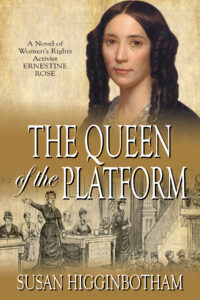Launch: Susan Higginbotham’s The Queen of the Platform: A Novel of Women’s Rights Activist Ernestine Rose
INTERVIEW BY DAVID CONNON
Susan Higginbotham is the author of a number of historical novels set in medieval and Tudor England and, more recently, nineteenth-century America. She lives in Maryland with her family. When not writing or procrastinating, she enjoys traveling and collecting old photographs. The Queen of the Platform is published today.
What is your elevator pitch?
The Queen of the Platform is the story of the indomitable nineteenth-century feminist Ernestine Rose, whose fearless advocacy helped bring about the rights women enjoy today.
The discussions between narrator Esther and her rabbi father ring true. What has informed your knowledge of cultural Judaism?
Research, mainly. And it helped that when I was younger, I seriously considered converting to Judaism and read quite a few novels by Jewish-American authors.
 What surprised you the most in researching and writing Queen of the Platform?
What surprised you the most in researching and writing Queen of the Platform?
I came across an immense surprise when researching Ernestine’s genealogy, but that would be a spoiler, so I’ll settle for saying that I am quite sure that she would not appreciate me having made that discovery. (Sorry, Ernestine!) I can more safely say, however, that I discovered the names of her parents, her sister, and her younger half-brothers, which sounds rather dull but in fact had eluded her modern biographers, as had the Big Surprise. Tracing the half-brothers was illuminating, and led me to believe that Ernestine and/or her contemporary biographers had exaggerated the insularity of her upbringing. Two of the half-brothers in particular were worldly, well-educated, and well-traveled, and had complicated romantic lives—not unlike their older sister.
You have a law degree. How did you decide not to write legal fiction?
It never occurred to me—for one thing, I’ve spent very little time in the courtroom, having worked for over two decades as an editor for a legal publisher. But that little time came in handy in writing courtroom scenes in several of my novels, including The Traitor’s Wife and The Queen of the Platform. And a legal education helps a great deal in historical research, because there’s considerable critical analysis involved in both.
How has your approach to writing books changed since you wrote your first novel?
It hasn’t, so it must be working! Because I write biographical fiction, I start with a historical figure who has intrigued me, and when I’ve done enough research to have a good grasp on my subject, I begin writing. But typically, questions arise as I write, so I never really stop doing the research. From time to time, I find out something that forces me to rewrite, because I try to stay close to history, and I don’t like to alter facts even if they’re not widely known. In The Queen of the Platform, for instance, I had to rewrite some early chapters, not only to accommodate what I had learned about Ernestine but what I had learned about her husband William. I had originally portrayed him as an orphan but discovered that he had a mother who was very much alive.
What motivates you to keep writing?
Readers who enjoy my work, and who are kind enough to say so.
Of all the figures in your novels, which one could you most identify with?
I can’t really focus on a single person, but all my heroines have one trait that I admire—resilience—and my favorites have a sense of humor as well. F. Scott Fitzgerald wrote, “Everyone suspects himself of at least one of the cardinal virtues,” and I guess those are two which I suspect I have.
Can you describe a time when a dream has helped you resolve a problem in a plot?
Sadly, that has never happened to me, but I do find that I have insights before I fall asleep or while I’m in the shower. With John Brown’s Women, I was dithering over what point in time to end the novel, and soon after I got comfy between the covers, it occurred to me that artistically, the novel needed to end just after John Brown’s funeral, which was just a chapter away from being written. And that’s where the novel does indeed end.
Have you ever visualized a character in great detail – and then seen that face on the street?
Strangely enough, except for my characters of whom portraits or photographs exist (as they do for Ernestine Rose), I have a rather vague idea of how my characters look—only general attributes such as physique and hair and eye color and whether or not other characters find them attractive. I’ve always felt slightly guilty about this, until recently when I was reading a biography of Jane Austen and the author pointed out that her heroines are also vaguely described. So there’s that! Actually, one of my discoveries in researching The Queen of the Platform was finding a newspaper reproduction of a photograph of Ernestine in old age that doesn’t appear in any of her biographies.
What are useful criteria for selecting the subject or protagonist of a historical novel?
I don’t really select my protagonists so much as they select me. I’ll become intrigued by someone I read about and research that person further. He or she will give me no peace until I give in and write about him or her (usually, her). I do tend to be drawn more toward lesser-known figures or those who I feel have gained an unjustly bad reputation.
 What is your next project?
What is your next project?
I am working on two. I found out so much when researching Ernestine Rose, I decided it was a shame not to use my research in a full-fledged biography of her. And when I took a trip to England (my first in many years) last November, it reawakened my interest in English history, so I am writing a novel about someone who began to nag at me—Licoricia of Winchester. She was a thirteenth-century moneylender, whose clients moved in high circles, and she lived a dramatic life, including multiple stays in the Tower, before meeting a tragic and mysterious end. This was a project I resisted, because I’ve been spoiled by the wealth of nineteenth-century resources, whereas much of Licoricia’s story has been lost to history, but she finally got her way with me.
What is a good book you’ve read recently?
Clare McHugh’s novel The Romanov Brides.






